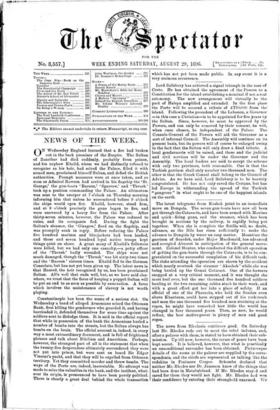Lord Salisbury has achieved a signal triumph in the case
of Crete. He has obtained the agreement of the Powers to a Constitution for the island establishing a nominal if not a real autonomy. The new arrangement will virtually be the pact of Halepa amplified and extended. In the first place the Porte will be secured a tribute of £T10,000 from the island. Following the precedent of the Lebanon, a Governor —in this case a Christian—is to be appointed for five years by the Sultan. Since, however, he must be approved by the Powers, and can only be removed by their consent, he will, when once chosen, be independent of the Palace. The Consuls-General of the Powers will aid the Governor as a sort of informal Council. The Assembly will continue on its present basis, but its powers will of course be enlarged owing to the fact that the Sultan will only draw a fixed tribute. A local gendarmerie will be raised, and these and the judicial and civil services will be under the Governor and the Assembly. The local leaders are said to accept the scheme with only two provisoes, both reasonable. One is that the Turkish garrison shall only number two thousand men. The other is that the Greek Consul shall belong to the Council of Advice. As we have said, Lord Salisbury is to be heartily congratulated. He has not only saved the Cretans, but has led Europe in withstanding the spread of the Turkish " gangrene " in what ought to be one of the happiest islands on the earth.


































